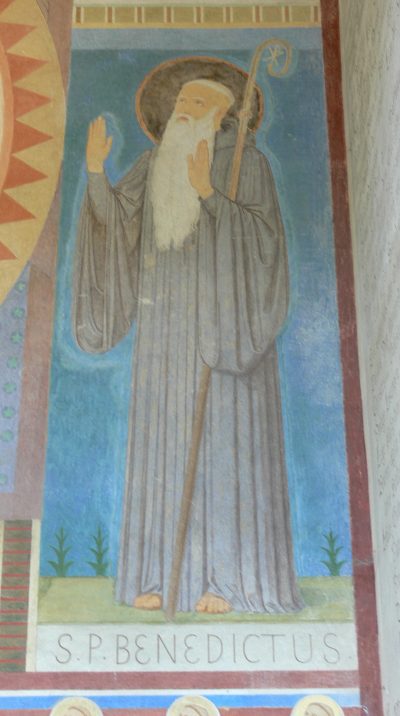How the Work of God is to be done in the day-time (XVI)

CHAPTER XVI. How the Work of God is to be done in the day-time
19 Feb. 20 June. 20 Oct.
As the prophet saith: “Seven times in the day have I given praise to Thee.” And we shall observe this sacred number of seven if, at the times of Lauds, Prime, Tierce, Sext, None, Vespers and Compline, we fulfil the duties of our service. For it was of these hours of the day that he said: “Seven times in the day have I given praise to Thee”; just as the same prophet saith of the night watches: “At midnight I arose to give Thee praise.” At these times, therefore, let us sing the praises of our Creator for the judgments of His justice: that is, at Lauds, Prime, Tierce, Sext, None, Vespers and Compline; and at night let us arise to praise Him.
Already, from the time of Tertullian (Letter on Prayer, Chapter 25) and of Saint Cyprian (On the Lord’s Prayer, Chapters 34–36), the Fathers and other ecclesiastical writers set forth the Church’s Hours of Prayer and the biblical and mystical reasons for each of them. To the three original Hours of Prayer that are of Jewish origin—daybreak, midday, and sunset—Christians added the third, sixth, and ninth Hours. Later, Prime and Compline were added, giving a total of seven day Hours, in fulfilment of the Psalmist’s words, “Seven times in the day have I given praise to Thee” (Psalm 118:164). The Night Office fulfils these other words of the Psalmist: “I rose at midnight to give praise to thee; for the judgments of thy justification” (Psalm 118:62). Saint Benedict holds to the full cursus of the Hours: seven day Offices, and one nocturnal Office; the sons of Saint Benedict must hold fast to the heritage they have received.
When on March 21st, 1924, the feast of Saint Benedict, Pope Pius XI promulgated the Apostolic Letter Equidem Verba, his intention was that Benedictine monasteries should be living centres of communion with the Eastern Orthodox Churches principally by their fidelity to the traditional daily round of liturgical prayer and by their assiduous dedication to the monastic Fathers of the undivided Church and the whole patristic tradition. Theological dialogue, if it is not yoked to prayer and penance, remains academic and sterile; agreements and declarations on paper do little to foster the unity for which Our Lord prayed in the Cenacle:
Ut omnes unum sint, sicut tu Pater in me, et ego in te, ut et ipsi in nobis unum sint: ut credat mundus, quia tu me misisti.That they all may be one, as thou, Father, in me, and I in thee; that they also may be one in us; that the world may believe that thou hast sent me. (John 17:21)
The liturgical prayer of monastic communities, on the other hand, is immediately intelligible to monks of the Eastern Churches, and supernaturally fruitful. Saint John Paul II wrote in Orientale Lumen [2nd May 1995)
Monasticism has always been the very soul of the Eastern Churches: the first Christian monks were born in the East and the monastic life was an integral part of the Eastern lumen passed on to the West by the great Fathers of the undivided Church. The strong common traits uniting the monastic experience of the East and the West make it a wonderful bridge of fellowship, where unity as it is lived shines even more brightly than may appear in the dialogue between the Churches. (Orientale Lumen, 9)
Saint John Paul II goes on to say:
In addition to knowledge, I feel that meeting one another regularly is very important. In this regard, I hope that monasteries will make a particular effort, precisely because of the unique role played by monastic life within the Churches and because of the many unifying aspects of the monastic experience, and therefore of spiritual awareness, in the East and in the West. (Orientale Lumen, 25)
A living fidelity to liturgical prayer in its traditional expression—seven times daily and once in the night, as Saint Benedict enjoins— is the single most credible contribution of Benedictine monks to the persistent efforts of the Popes of modern times to build bridges between East and West. The Orthodox soul is not touched by Western efficiency, nor by humanitarian works, nor by academic exchanges; the Orthodox soul is touched by prayer, and vibrates intensely to the traditional monastic liturgy, steeped as it is in Sacred Scripture and in the Fathers, and celebrated with dignity, beauty, and sobriety. For this reason, Chapter XVI of the Holy Rule has implications that go far beyond the mere ordering of the Opus Dei in any given monastery.
As a kind of footnote, I should like to say again that our dedication to adoration of the Most Holy Sacrament of the Altar finds its highest expression in the Opus Dei, and prolongs the Opus Dei in silence throughout the day. Tibi silentium laus (Psalm 64:1). In this, the distinctively Western and late medieval practice of perpetual adoration of the Most Holy Sacrament complements the aspiration of the Eastern hesychast fathers to a ceaseless prayer of the heart. The seven day Offices remain the heartbeat of a prayer that vitalises the whole Church. The wellspring of perpetual adoration lies in the bosom of the Father, where the Eternal Son holds Himself before the Father’s face: “In the beginning was the Word, and the Word was with God, and the Word was God” (John 1:1).
